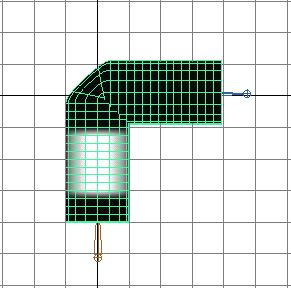This example is similar to
Skinning a cylinder by
smooth skinning,
so that you can compare rigid skinning with smooth skinning.
Skinning a cylinder by
rigid skinning
To create the cylinder
- Create a NURBS cylinder with the following
options:
- Height: 8
- Sections:
16
- Spans: 32
To create the skeleton for the cylinder
- Build a skeleton for the cylinder. Have
the skeleton consist of a single joint chain with about seven joints.
This skeleton consists
of one joint chain (joint1 through joint7). Joint4 starts approximately
in the center of the cylinder.
To bind by rigid skinning
- Select skeleton’s root joint (default
name: joint1).
- Select
Skin > Bind Skin > Rigid Bind.
To exercise skeleton
- Select the joint approximately at the
center of the cylinder (for instance, joint4), and rotate it about
90 degrees.
Rigid skinning provides
a sharp deformation effect around the rotated joint. You can adjust
the deformation effect with the Paint Cluster Weights
Tool.
To paint creasing effects
- Select smooth shaded display mode (hotkey:
press 5).
- Select the cylinder.
- Select
Edit Deformers > Paint Cluster Weights Tool >
 .
.
- In the Tool Settings window,
the paintWeights box should be
displayed.
- Note the cluster box.
- Click a rigid skin point set. For example,
joint3Set1.
- In the Clusters box,
click another rigid skin point set. For example, click joint4Set1.
- Check the other rigid skin point sets.
For example, check joint2Set1.
- Use the Paint Cluster Weights
Tool’s brush to smooth the deformation effect.
To further smooth and
deform rigid skinning, you can use flexors. For more information,
see
Create all types of flexors.


 .
.



